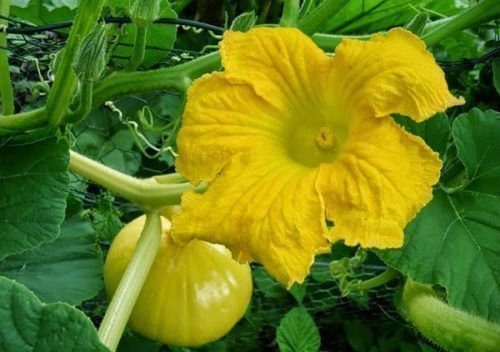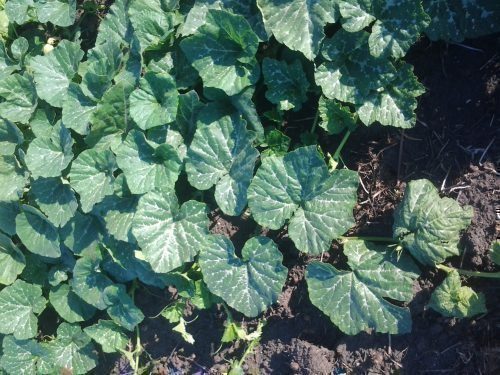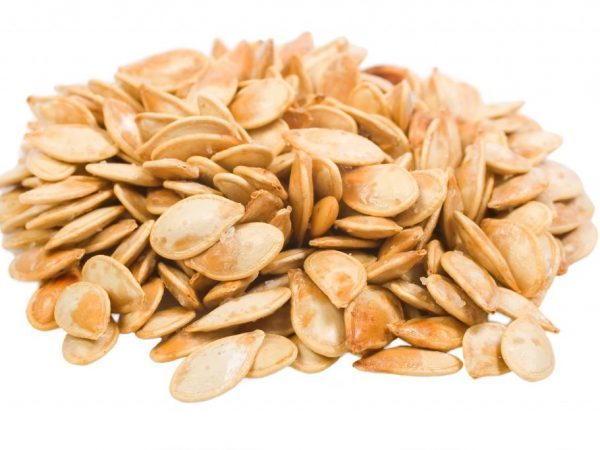Content
Pumpkin Pearl is one of the most popular varieties of butternut pumpkins among Russian gardeners. The variety was included in the State Register in 2000 and approved for cultivation in the North Caucasian, Ural and Far Eastern regions for commercial production and in private household plots.
Description of pumpkin variety Muscat Pearl
The plant of this variety is long-leaved, has a powerful bush with a stem 70–100 cm long, on which 5–7 lateral shoots are formed. On each ovary is formed, as a rule, one on each shoot. Leaves are medium in size, dark green with slight splashes of white spots. The leaf plate is not dissected, has a pentagonal shape, and is covered with a small fluff on the outside.
Male and female flowers are formed on the plant, after pollination by bees, ovaries are formed from female flowers. The flowers are large, bright yellow, have 5 petals.
Description of fruits
Description of ripe fruits of butternut pumpkin Pearl differs significantly in some sources - in the photo of the same variety, you can see pumpkins of different sizes, shapes and colors. The appearance of this vegetable depends on the seed producer. Most often, pumpkins of the Muscat Pearl variety are large, elongated cylindrical in shape, resembling a squash, with a rounded or oval thickening in the top part. It contains a small seed nest, consisting of three cavities filled with medium-sized wide oval seeds. Fruits can be smooth or slightly segmented, 45 - 55 cm long, in some cases their weight can reach 8 kg, but more often it ranges from 4 to 7 kg. The peel is thin, plastic, greenish-orange or bright orange at maturity. In reviews of the Pearl butternut squash, you can see a photo of fruits that have spots or stripes of a lighter color or a pattern in the form of a fine mesh. The pumpkin pulp of this variety is dark orange, juicy, crispy, aromatic, with a fibrous structure. The taste is sweet. Many vegetable growers call this pumpkin the most delicious and aromatic variety among all varieties of this vegetable.
The high content of carotene in the pulp (about 14 mg per 100 g), pectin substances and mineral salts gives a special value to butternut pumpkin Pearl. It is also rich in vitamins of group B, PP, E, K, as well as provitamin A. The low calorie content of this culture makes it popular in dietary nutrition.
This type of butternut pumpkin belongs to the universal table varieties, the fruits are widely used in the preparation of soups, vegetable side dishes, cereals, desserts, baking fillings, juices. It is excellent for canning and deep freeze tolerant. Like other sweet-fleshed varieties, Buttermeg Pearl is used in baby food.
The healing properties of Muscat pumpkin Pearl are also known: it has a diuretic effect, is good for the heart and eyes, its regular use increases immunity, and vitamin K slows down the aging process.
Variety characteristics
In the description of the pumpkin variety Pearl, its resistance to low temperatures and other unfavorable weather conditions, high yield, ability to tolerate drought painlessly and good keeping quality are noted.
Pumpkin Pearl is considered a mid-late variety. From the moment of planting the seeds to harvest, 110–130 days pass.
Subject to agricultural technology, up to 15 kg of fruits are harvested from 1 m², while the warmer the growing region, the richer harvest can be expected.
The yield of the pearl pumpkin variety directly depends on weather conditions (in particular, air temperature), soil fertility, pre-sowing treatment of planting material, irrigation and feeding regimes.
Pest and disease resistance
Pumpkin nutmeg Pearl suffers from the same diseases as other melons and gourds. The most common ailments: anthracnose, root rot, powdery mildew, fusarium wilting. The main preventive measures against these and other diseases are observance of crop rotation and pre-sowing treatment of planting material.
Pumpkin nutmeg variety Pearl is susceptible to the invasion of pests. Most often, she suffers from the following insects: melon aphid, spider mite and bear.
Advantages and disadvantages
The undoubted advantages of the Pearl variety include:
- drought resistance;
- cold resistance and resistance to temperature extremes;
- excellent taste and aroma;
- fruit shape convenient for storage and use;
- large volume of pulp due to the small seed cavity;
- high nutritional value;
- good transportability, keeping quality.
Although this variety has no obvious disadvantages compared to other varieties, many vegetable growers pay attention to its following characteristics:
- susceptibility to disease;
- exactingness to soil quality and care;
- a sharp decrease in taste during long-term storage.
Growing Butternut Gourd Pearl
Butternut squash The pearl is a relatively unpretentious variety. Its cultivation does not require additional effort and time from the grower in order to get a good result, it is very important to be attentive to its needs.
As with all pumpkin plants, a sunny area, protected from strong winds, is chosen for planting this culture. The plant prefers sandy or light loamy soil. Experienced gardeners know that a rich crop can be reaped by planting a pumpkin next to or directly on a compost heap.
In order to avoid contamination of the pumpkin with diseases and pests, it is recommended to plant the pumpkin after potatoes and legumes, but the soil on which cucumbers, zucchini and squash grew is unsuitable for it.
In the southern regions of the country, butternut squash Pearl is grown by a seedless method, that is, by sowing seeds directly into open ground. They begin planting in late May - early June, when the soil warms up to + 13 ° C.
The most favorable temperatures for the growth of the bush and fruit setting are indicators in the range from + 18 ° C to + 25 ° C.
Forcing seedlings begin from the end of April, about a month before the expected date of planting young plants in a permanent place.
Both when sowing seeds in the ground and when forcing seedlings, the seeds are preliminarily prepared: they are soaked for 18 - 20 hours in a weak aqueous solution of potassium permanganate, then washed, dried and treated with a fungicide to prevent plant diseases.
On the planting bed, they are located at a distance of 1 to 1.5 m from each other.
When the bushes grow up and begin to branch, in order to stimulate the formation of adventitious roots, which provide the plant with additional nutrition, the internodes should be sprinkled with damp earth. This procedure is carried out 2-3 times per season.
Water the butternut pumpkin Pearl only with warm water and only at the root at the rate of 5 liters of water per plant. Waterlogging of the soil should be avoided so as not to provoke rot infestation of the plantings.
Several times a season pumpkin is fed with organic and mineral fertilizers.
Routine activities include weeding and loosening. They not only facilitate the access of oxygen to the plant's root system, but also prevent the development of diseases and pests.
Harvesting is carried out at the end of August - the first half of September. Pumpkins of this variety are cut and stored along with the stalk.
Conclusion
Pumpkin Pearl has won the special love of vegetable growers due to its successful combination of unpretentiousness, cold resistance, ability to tolerate drought well and excellent taste. The sweetness and aroma of this pumpkin variety are liked not only by adults, but also by children, and the nutritional value makes it popular in dietary and medical nutrition.












